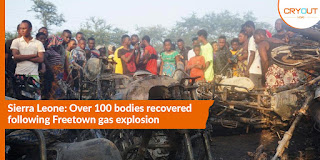Sierra Leone, Gasoline Truck Explosion - CSR and the Oil and Gas Industry
Free Town.
A few days ago a gasoline truck collided with another truck in the city streets of Freetown in Sierra Leone. This is what CNN wrote: 'The explosion occurred after two vehicles collided on the highway while the fuel tanker was about to enter a nearby filling station to discharge its fuel, the NDMA said in a statement posted to Facebook on Saturday afternoon. Footage and eyewitnesses intimated that while the collision took place, both drivers came out of their vehicles and warned community residents to stay off the scene while trying to address a leakage emanating from the collision," the statement said. It added that while that was happening, "some community members rushed to the scene and took advantage of the leakage to scoop fuel and store it in nearby makeshift structures."
Because I happened to train a group of Freetown Petroleum Storage
Terminal operators and loading masters last week, I wanted to express my condolences to those families who lost loved ones. I am writing this
short blog on an assumed and probable analysis of this accident, because we need to ask this
question: ‘seek knowledge of causes’. Because I have lived and worked in Africa several years, I can only conclude that 2nd cause is unawareness of the hazardous
properties of gasoline, but that the principal first cause is poverty. I can only
imagine that when gasoline is leaking out of a truck, right in front of your
home, you may think; ‘Wah, today we can fill our tanks for free; so let’s get
jerrycans!’
I can imagine a growing crowd thinking the very same, all rushing to
the trucks to get their share of the loot, not understanding, because no one
informed them, that the ignition temperature of gasoline vapour is about between
250 and 280 degrees Celsius and that the breaks temperature of trucks can reach
500 degrees Celsius. It can be assumed that the heat generated by the explosion
i.e. fireball exceeded 8000 degrees Celsius. Perhaps someone lit a cigarette,
or wore cheap static electric clothes, or messed with the wrenched steel, no
one knows. Fact is that information about hazardous compounds is not
shared with the general public, which I believe is the responsibility of all us
working in the oil and gas sector. So, my call on you; let’s create a online information and learning
platform to prevent such devastating accidents from happening in the future in countries less fortunate? Please sponsor education and awareness training programs thru our website www.tankterminaltraining.com?




Reacties
Een reactie posten